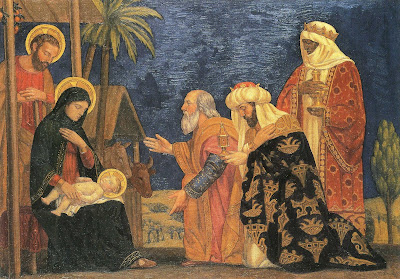Solemnity of the Epiphany of the Lord
Matthew 2:1-12
When Jesus was born in Bethlehem of Judea, in the days of King Herod, behold, magi from the east arrived in Jerusalem, saying, “Where is the newborn king of the Jews? We saw his star at its rising and have come to do him homage.” When King Herod heard this, he was greatly troubled, and all Jerusalem with him. Assembling all the chief priests and the scribes of the people, he inquired of them where the Messiah was to be born. They said to him, “In Bethlehem of Judea, for thus it has been written through the prophet: ‘And you, Bethlehem, land of Judah, are by no means least among the rulers of Judah; since from you shall come a ruler, who is to shepherd my people Israel.'” Then Herod called the magi secretly and ascertained from them the time of the star’s appearance. He sent them to Bethlehem and said, “Go and search diligently for the child. When you have found him, bring me word, that I too may go and do him homage.” After their audience with the king they set out. And behold, the star that they had seen at its rising preceded them, until it came and stopped over the place where the child was. They were overjoyed at seeing the star, and on entering the house they saw the child with Mary his mother. They prostrated themselves and did him homage. Then they opened their treasures and offered him gifts of gold, frankincense, and myrrh. And having been warned in a dream not to return to Herod, they departed for their country by another way.
Introductory Prayer: Lord, thank you for your perfect gift of yourself: coming as a humble child born of Mary. The thought of you as a helpless little babe lying in a manger fills my heart with confidence. I know that you could never be capable of deceiving me, since you have divested yourself of all greatness so that I can gaze upon you. You deserve all my hope and all my love, which I humbly offer you now.
Petition: Lord, I ask you for a heart truly receptive to your message.
1. We Saw His Star: Those who are sincere of heart find God in their life. In the case of the Magi, their sincerity is shown by what they are willing to sacrifice to attain their goal. The journey required abandoning the comforts of their homeland, the needs of their family members, and the pursuit of wealth. The intention was pure, not muddled with self-centered wants, for it was nothing less than the desire to encounter God’s living presence. Their openness of heart permitted God to speak through many things in their world—from astrology to Herod, from the star to the child in the crib. What will it take for me to find God today? I must put aside all but him and let his hand lead me to that definitive encounter with his divine presence.
2. Warned Not to Return to Herod: No star is offered to Herod or to the worldly, only darkness. The worldly may like the idea of God, and even be curious about him, but they disregard his call. They rarely leave their palace, sacrifice their time, or place themselves at the service of the divine. The prideful lovers of comfort leave their palaces and then oddly claim God is nowhere to be found in the world. They fear the loss of a comfortable world. I pray that my heart be open to all that the living Gospel requires in my life. May Christ find no obstacle in me; rather, may he find in me the will to leave my palace so that I might find and follow him.
3. Then They Opened Their Treasures: In order to give love, I must have been impacted by love. How can I hold to the demands that others place upon me? How can I keep true to my vocation and mission when little affirmation and support come my way? Every morning I need to seek out the God who gives unconditionally so that his giving may impact me. Be it at Mass, in prayer, or in the workings of divine providence, every day a necessary epiphany awaits me. It empowers me to open my coffer and bring forth the gift of self. If I do not experience this love, my life remains closed—no interior strength is found to give myself totally. John tells us: “In this is love, not that we love God, but that he loved us and sent his Son to be an atoning sacrifice for our sins. Brothers, if God so loved us, we too ought to love each other…. We love because he first loved us” (1 John 4:8, 20).
Conversation with Christ: Christ, your love for me compels me to give myself and hold nothing back. I have touched a moment in human history that overwhelms my comprehension and conquers my heart for you. May I give myself as you give yourself to me: at Mass, in prayer, and in souls you call me to serve.
Resolution: I will work to improve my charity with the members of my family today, loving them as Christ does.



